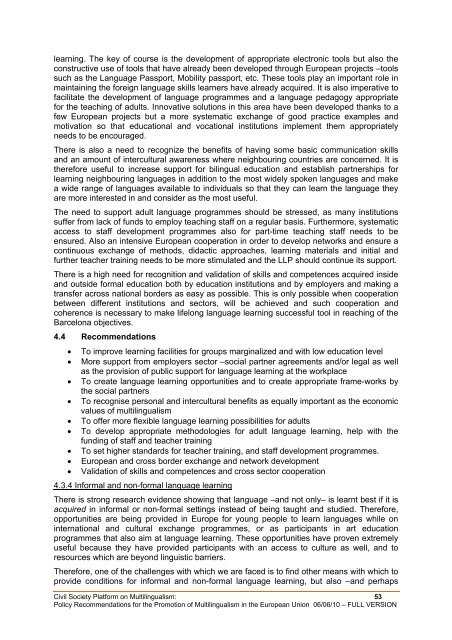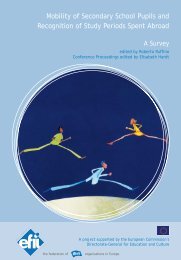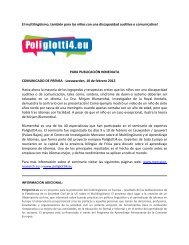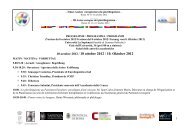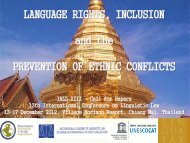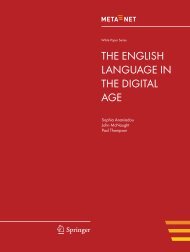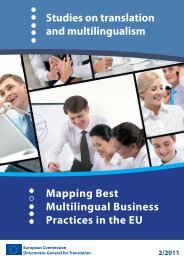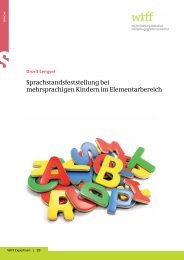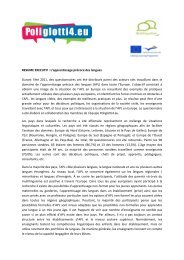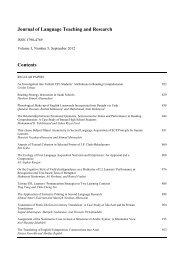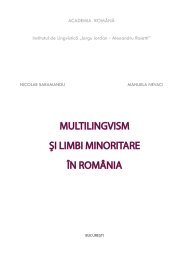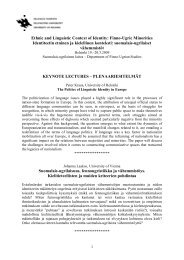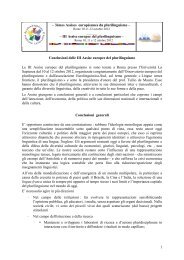4.3.3 Provide incentives for lifelong language learningAccording to a recent Eurobarometer survey, 87 the progress towards reaching the 1+2Barcelona objective regarding language learning is rather slow for a variety of reasons whichhave to do with how languages are taught and tested in the formal education system, andalso because there is lack of awareness that language learning is a lifelong task. In most EUmember states it is considered the exclusive task of the school, of examining bodies andteachers to help students attain a given level of proficiency in a particular language at aparticular moment in time. Therefore, school appears to be the only place where <strong>European</strong>slearn foreign languages. However, it is crucial if we are to achieve the ambitious Barcelonagoal, and face challenges such as globalization and aging populations, it is important topromote language learning from ‘cradle to grave’. This means that it is of central importancethat the school help to develop young people's motivation, their ability to learn languages andto build up confidence in facing new language experience out of school.Lifelong learning does not just happen. It starts in school and embraces all areas formaleducation once school is finished (e.g. vocational training, university and adult education). 88Given the smaller number of young people entering education due to demographic changeand the goal to reach all citizen, increased focus is now needed on updating adults’competencies throughout their lives. Adults are more likely to be monolingual, especially ifthey have relatively low qualifications and job positions. They often point to lack of time andmotivation as the main reasons for not learning languages, followed by a need for moreflexible provision. 89 It is especially important to improve appropriate learning opportunities forpeople with a low educational level, for example to adults without a school diploma or anyvocational training, which more likely will not have enough opportunities to learn at least oneforeign language. In this context, appropriate teaching and learning methodologies have tobe used that take the lack of formal schooling into account.To raise the motivation to make both financial and time efforts to invest into languagelearning is without doubts one of the biggest challenges and shouldn’t be underestimated.However, the biggest challenge in the field of lifelong language learning is not necessarilylack of motivation due to a low level of awareness of its importance, but rather due to manymore or less practical obstacles faced when deciding to learn a second or third language,such as limited provisions for adult learners, scheduling of courses (not taking intoconsideration work, family or other commitments) and lack of investment or support byemployers and non-existing recognition of or reward for (additional) language skills in theworkplace. Getting support from employers in the form of time or money is one of the biggestchallenges of lifelong language learning. It seems to be obvious that when multilingualismhas been recognized as one of the key competences and language learning identified as animportant tool in facing the social and economic challenges, both the public and privatesector will have to contribute to it as well. This contribution might be through the creation oflegal frameworks and / or social partner agreements as well as the provision of publicsupport for language learning at the workplace. The social partners are also asked to createlanguage learning opportunities and to create the appropriate framework for this in eachcase.When it comes to lifelong language learning, it is important to stress that non-formal learningenvironments play a crucial role, and therefore it is important that people be helped todevelop strategies for language learning and ways of coping with self-access language87 56% of citizens in the EU Member States are able to hold a conversation in one language apart from theirmother tongue. With respect to the goal for every EU citizen to have knowledge of two languages in addition totheir mother tongue, 28% of the respondents state that they speak two foreign languages well enough to havea conversation (Eurobarometer: <strong>European</strong>s and their Languages February 2006)88 All these are components of a comprehensive system that are of equal value. See EAEA, Adult educationtrends and issues in Europe (2006)89 Communication from the <strong>Commission</strong> to the <strong>European</strong> Parliament, the Council, the <strong>European</strong> Economic andSocial Committee and the Committee of the Regions COM(2008) 566 final.Civil Society Platform on Multilingualism: 52Policy Recommendations for the Promotion of Multilingualism in the <strong>European</strong> Union 06/06/10 – <strong>FULL</strong> <strong>VERSION</strong>
learning. The key of course is the development of appropriate electronic tools but also theconstructive use of tools that have already been developed through <strong>European</strong> projects –toolssuch as the Language Passport, Mobility passport, etc. These tools play an important role inmaintaining the foreign language skills learners have already acquired. It is also imperative tofacilitate the development of language programmes and a language pedagogy appropriatefor the teaching of adults. Innovative solutions in this area have been developed thanks to afew <strong>European</strong> projects but a more systematic exchange of good practice examples andmotivation so that educational and vocational institutions implement them appropriatelyneeds to be encouraged.There is also a need to recognize the benefits of having some basic communication skillsand an amount of intercultural awareness where neighbouring countries are concerned. It istherefore useful to increase support for bilingual education and establish partnerships forlearning neighbouring languages in addition to the most widely spoken languages and makea wide range of languages available to individuals so that they can learn the language theyare more interested in and consider as the most useful.The need to support adult language programmes should be stressed, as many institutionssuffer from lack of funds to employ teaching staff on a regular basis. Furthermore, systematicaccess to staff development programmes also for part-time teaching staff needs to beensured. Also an intensive <strong>European</strong> cooperation in order to develop networks and ensure acontinuous exchange of methods, didactic approaches, learning materials and initial andfurther teacher training needs to be more stimulated and the LLP should continue its support.There is a high need for recognition and validation of skills and competences acquired insideand outside formal education both by education institutions and by employers and making atransfer across national borders as easy as possible. This is only possible when cooperationbetween different institutions and sectors, will be achieved and such cooperation andcoherence is necessary to make lifelong language learning successful tool in reaching of theBarcelona objectives.4.4 Recommendations To improve learning facilities for groups marginalized and with low education level More support from employers sector –social partner agreements and/or legal as wellas the provision of public support for language learning at the workplace To create language learning opportunities and to create appropriate frame-works bythe social partners To recognise personal and intercultural benefits as equally important as the economicvalues of multilingualism To offer more flexible language learning possibilities for adults To develop appropriate methodologies for adult language learning, help with thefunding of staff and teacher training To set higher standards for teacher training, and staff development programmes. <strong>European</strong> and cross border exchange and network development Validation of skills and competences and cross sector cooperation4.3.4 Informal and non-formal language learningThere is strong research evidence showing that language –and not only– is learnt best if it isacquired in informal or non-formal settings instead of being taught and studied. Therefore,opportunities are being provided in Europe for young people to learn languages while oninternational and cultural exchange programmes, or as participants in art educationprogrammes that also aim at language learning. These opportunities have proven extremelyuseful because they have provided participants with an access to culture as well, and toresources which are beyond linguistic barriers.Therefore, one of the challenges with which we are faced is to find other means with which toprovide conditions for informal and non-formal language learning, but also –and perhapsCivil Society Platform on Multilingualism: 53Policy Recommendations for the Promotion of Multilingualism in the <strong>European</strong> Union 06/06/10 – <strong>FULL</strong> <strong>VERSION</strong>


